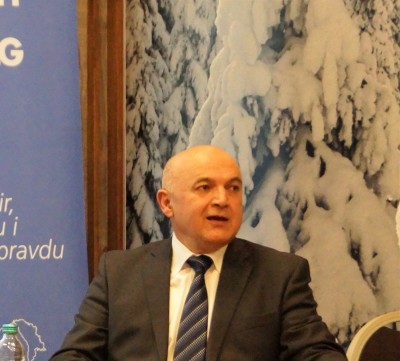Read an interview with Mr. Ljubo Jurcic, a professor at the Faculty of Economics in Zagreb and the president of the Croatian Association of Economists, conducted during conference “Economy in Media – Media on Economy” organized by Center for Research and Studies GEA.

Mr. Jurcic, as the president of the Croatian Economic Association and professor at the Faculty of Economics in Zagreb, how do you see the position of Croatian and regional economies in the international context?
The essence of every economy is to organize resources on the territory of its sovereignty, while the state exists only for its people. They have to work in order to realize their standard and obtain their wage. Wage is important because when people receive wage they buy goods, which creates demand, which increases production. Thereby, tax revenues increase also, which decreases public debt. So, the essence of economy is that people are employed and paid for their work. Even the USA, as the most liberal country, primarily focuses on preserving high employability, i.e. a low rate of unemployment. When a country has a high rate of employment it also has a high level of production, budget revenues, and resolved welfare issues because those who receive wage do not receive welfare allowance. So there you have that first goal.
The second goal is production. Production can be increased by technology, organization, various incentives, even though wages, through increased demand, are the best incentive for the entrepreneur. However, when it comes to new products and new technologies, the state must have the system that will enable people infrastructure, knowledge, and institutions needed to create a new product and to start new production. For example, in Europe and the world, these are now renewable sources of energy. Not a single entrepreneur would be able to produce it alone without the state organizing education, institutions, and infrastructure. That means that the role of sovereign states of today is to create new technologies, open new sectors, new production lines, etc. However, small and medium-sized states such as Croatia or Bosnia and Herzegovina that do not have a convertible currency (even though B&H has the word “convertible” at least in the name of its currency) must then focus on exports. A big country does not need to encourage exportation because it is self-sufficient, but a small country, which may not have a convertible currency, is forced to export and it has to pay imports in a foreign currency that can only be obtained from exports. Therefore, exportation is important because it can pay imports. If a country cannot pay imports then it falls into external debt. External debt is not that important for big countries and countries with convertible currencies, but for small countries external debt is more important than internal, i.e. public debt.
When talking about Croatian and regional economies one has to be aware of changes that occurred in the structure of global economy. The world produces around 58 000 billion Euro. Europe and the USA are the biggest players, but China plays an important role too, especially in the last 15 years during which the participation of China jumped from 3% to today’s 13,30%. Structure of global product is changing. If we talk about the crisis, China did not feel it at all. It had significant growth and, in terms of real production, the world also was not in crisis, only when prices of exported products declined the total value obtained when amount is multiplied by price was lower. In regional terms, Croatia still has not exited from the crisis to this day. On the other hand, if we look at some transitional countries that joined the European Union, their GDP is about 10% higher than in 2009, while in Croatia it is 12% lower when compared to the same period. When it comes to B&H, in 2013 it reached the 2008 level, according to the World Economic Outlook data published by the IMF.
If we take GDP per capita as another indicator, we see it is the lowest in B&H and Macedonia ranging from 3.500 to 3.900 Euro, while it was 27.400 Euros at the EU level. It is similar in terms of unemployment. At the EU level unemployment was a little above 9% on average, while in B&H and Macedonia it was 27% according to ILO data (International Labor Organization). Another important indicator is wages, which I already talked about at the beginning. The average net wage in the EU is around 1.500 Euro, while in Croatia the amount is more than two times lower, with the lowest wages being in B&H and Macedonia, only a little above 400 Euro.
However, global crisis is not an excuse for such situation. The excuse is the country’s system, above all political and economic system. Asian developing countries prove that the world can grow. Their growth was even over 100% in comparison with 2008.

What are the solutions then?
Going back the same road again is not the solution. Market is the best allocator of resources in perfect conditions, but if perfect conditions do not exist, the state must intervene. In terms of Croatia, I see five elements where adequate reaction did not occur and which have led to this situation. Firstly, there was privatization. In this process the state did not find entrepreneurs that would have started production but these were mostly rentiers or speculants who bought assets only to sell it more expensively afterwards. Secondly, there was bankruptcy. In 1994, Croatia overestimated the value of the Kuna in relation to the German Mark by 20-30%, increasing the price of Croatian products and decreasing the price of imported goods, by which imports replaced exports. Thirdly, there was foreign currency clause, which is a crime against domestic economies because that is how an important pillar of monetary policy is lost. The fourth issue is the pension pillar, which spends around 5 billion Kuna annually. Finally, the fifth issue is the wrong structure of investments. There were too many investments on infrastructure, highways, etc. and insufficient investments in production lines that generate jobs.
Once again, the solution is not to go back to the beginning. It has to be sought in line with present developments, analyzing the situation of today, the structure of domestic economy, the surroundings. Only then the best solutions and policies must be sought, but using only available knowledge, without looking for magical solutions that will make it all right with one move. The common problem of all our countries is that we have failed to build state institutions. We do not have institutes for monitoring any aspect of social and economic life in the professional way to serve as support to the government, to name the source of the problem and potential solutions, so the politics could choose between offered potential solutions. Likewise, entrepreneurs do not have enough support to monitor trends in individual sectors in our countries and globally, new technologies, market structure,… Developed countries have all this and it may not be visible at the first glance but this is how they complete up to 80% of product development and market appearance. Let’s take iPhone for example. Steve Jobs put everything into one whole, but all important elements, 6-7 of them had previously been developed by American state institutions for the needs of space, military, and other industries. Steve Jobs only put it all together into an excellent consumer product.
Speaking about high unemployment as the key problem of national economies in Croatia and Bosnia and Herzegovina, which preconditions have to be provided in order to decrease unemployment and increase the share of active population?
A systematic intervention is needed. An increase of employment can occur only from demand for work and demand for work can occur only if there is demand for products. If we create a policy of demand for products made in our countries, then demand for production and production factors, such as labor, will occur also. Therefore, incentives per employee and similar encouragement measures can give only short-term effects. You do not encourage production thereby, but you only decrease its costs and improve statistics for a short period of time. So, the main goal should be the increase of demand. It can occur with the increase of exports and domestic demand. It is important to meet the increased domestic demand from domestic production as much as possible. It is necessary to develop a policy for the increase of exports in order to compensate the created difference that cannot be met by domestic production. Export-oriented countries such as the USA, England or Germany can easily increase domestic demand because the share of imports is only 10 to 15%. Small countries like ours must pay special attention. For example, my proposal for Croatia was to increase demand not by the construction of new capacities but by allocating a billion Kuna annually to pensioners so they could go to a Croatian hotel for five days. That is how you can keep the job for 30.000 people who work only during the summer season. Another example, like in Slovakia, Czech Republic, and some other countries, is when the state issues vouchers that can be spent only on products and services of domestic entrepreneurs. For example, there are vouchers for small businesses. Every elderly person can get a 200 Kuna voucher to use the services of a hairdresser, plumber, etc., which gives you various incentives to encourage activities using the existing capacities, without problems with some investments and income allocations for investments, because the capacities are already there. That is one option. Another option for small countries is to support exportation.
Speaking of exports, how can we increase exports with our weak competitiveness, lack of qualified workforce and low productivity?
Labor productivity is dominantly determined by technology, management, and then workforce. In Bosnia and Herzegovina, when a worker who does not have a job or works for a 500 BAM wage goes to Slovenia or Germany, he or she earns 1.500 Euro for the same job. It means that labor productivity depends on the organization and system where he or she works. Here, workers are victims of incapable micro and macro management. If you bring new technology in B&H and pair it with good management, you will have high labor productivity. There are already such examples in Herzegovina as far as I know. You need only 3 or 4 engineers per a hundred workers. The rest can be semi-qualified workforce. Therefore, this insisting on the educated workforce is partially alright, but mostly it is not, because the system does not provide you other components to employ such workers. As I said, we are victims of an economic system that is not built entirely and an economic policy that is wrong. Besides the macro level, we also lack in micro management in companies, which is the result of bad privatization, because managers are not entrepreneurs but rather rentiers and speculators.
How to encourage investment in new technologies without investment in research and development?
In our countries this is but mantra because in this environment it does not make sense. For example, steam engine was known in Alexandria before Christ, but it could not be used until 1700s and 1800s when an environment where it was useful was created. So, you can bring advanced technology that saves 20.000 Euro per employee. Technologies are obtainable today, no one can forbid you from buying one. It is what Japan, USA, or Germany have. Basically, they do not sell only those technologies saving more than 20.000 Euro per employee because that is their comparative advantage. The reason why this cannot be exploited efficiently here is the structure of society and the structure of economy. The problem is also economic and social environment.
My opinion is that the EU needs to change its approach. Since Bosnia and Herzegovina is in the accession process to the EU, and if Europe truly wants to develop this region, then it should change its approach. For example, out of the total of around 15.000 parts for the automobile industry, technology for some 100-200 of them can be transferred here, people can be trained and organizations moved to B&H. That is how you can open a few factories with 200 employees each, which would mean nothing to the European automobile industry but would create excellent conditions here. That is how favorable conditions can be created in 50-60 sectors, where the final product does not have to be completed but only partially assembled. In relation to the current financial approach, that would be a significantly different approach that could advance the entire Balkans. The Balkans can progress forward only with the production approach by making a list of products that could be made here and then by giving subventions, not necessarily to Bosnia and Herzegovina but to European companies that would transfer their technologies in B&H. The production approach does not mean giving money away. At the moment, it is as if you give money to children and let them outside so you do not have to worry about them anymore. I would prefer if money from Europe would finance one Balkan institute, a South-East European Institute, a name acceptable to all, which would make a regional analysis and identification of resources in order to be able to use those resources optimally for particular identified products. Presently, entrepreneurs are on their own.
Can Bosnia and Herzegovina develop significantly in terms of economy without resolving the political issue and permanent constitutional framework?
As I see it, the politics in B&H has relied on people’s emotions for a long time. My opinion is that a man with a secure job and decent paycheck is much more tolerant. Of course, extremes have always existed and will exist, but they are handled by the police. A modern democratic system must be built here for sure, but also an economic system in which it will be irrelevant whether you are a Serb, Croat or Muslim and which will be focused on the creation of new jobs and factories. When people start going to work and receiving wage they will care more about how to keep their job and not about who belongs to which nation. Therefore, I think Europe must change its approach. Europe must come here with an economic concept of employment and production for Europe, which would solve 80% of all problems. It is the only way to settle the Balkans down because the Balkans is a powder keg, a place that has always been the site of the clash of civilizations, scripts, cultures, etc.

